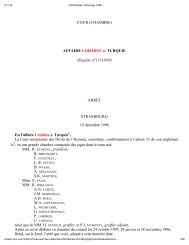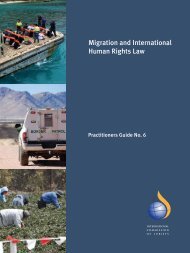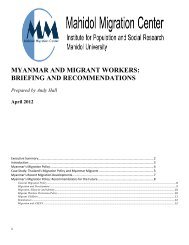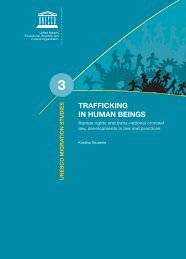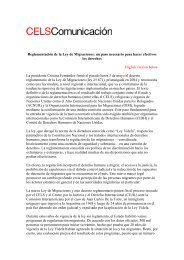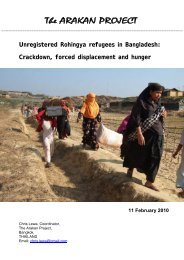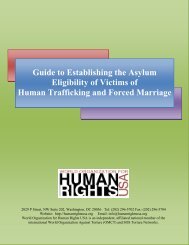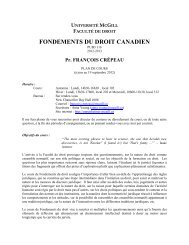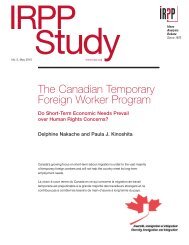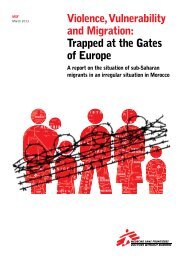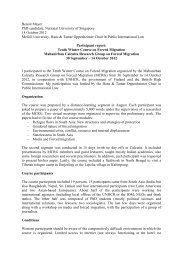Access to Justice for Migrant Workers in BC - West Coast Domestic ...
Access to Justice for Migrant Workers in BC - West Coast Domestic ...
Access to Justice for Migrant Workers in BC - West Coast Domestic ...
Create successful ePaper yourself
Turn your PDF publications into a flip-book with our unique Google optimized e-Paper software.
employers argued that the rise <strong>in</strong> m<strong>in</strong>imum wage <strong>for</strong> caregivers meant that the cost of<br />
childcare and elderly care was becom<strong>in</strong>g <strong>in</strong>accessible. Indeed, some employers wrote <strong>to</strong><br />
<strong>BC</strong> Premier Christy Clarke <strong>to</strong> protest the <strong>in</strong>crease and demand the right <strong>to</strong> charge live-<strong>in</strong><br />
caregivers more per month <strong>for</strong> accommodation <strong>to</strong> make up the difference. 75 Whilst access<br />
<strong>to</strong> af<strong>for</strong>dable childcare that allows women and men <strong>to</strong> return <strong>to</strong> the work<strong>for</strong>ce after<br />
maternity/paternity leave is important, this should not be done at the expense of abus<strong>in</strong>g<br />
the rights of live-<strong>in</strong> caregivers <strong>to</strong> a decent wage and overtime pay.<br />
WCDWA’s research f<strong>in</strong>d<strong>in</strong>gs align with those of other academics and researchers.<br />
Gerald<strong>in</strong>e Pratt describes how CIC’s treatment of live-<strong>in</strong> caregivers as temporary workers,<br />
rather than permanent residents, legitimizes “wage levels and work<strong>in</strong>g conditions<br />
unacceptable <strong>to</strong> Canadian citizens” while fram<strong>in</strong>g women who demand their workers’ rights<br />
as “greedy”. 76 Such was the case with one of the women the research team <strong>in</strong>terviewed<br />
who, after work<strong>in</strong>g over a month without be<strong>in</strong>g paid, asked <strong>for</strong> payment. Her employer’s<br />
wife accused her of be<strong>in</strong>g selfish and only th<strong>in</strong>k<strong>in</strong>g about her salary. Eventually, she was<br />
only given $500 <strong>for</strong> the first month of work and subsequently always had <strong>to</strong> ask multiple<br />
times, often wait<strong>in</strong>g weeks, <strong>to</strong> receive any payment at all. Her employer’s wife would always<br />
accompany her <strong>to</strong> the bank <strong>to</strong> deposit her cheque and had asked her on occasion, “do you<br />
really need the money”<br />
Adequate Hous<strong>in</strong>g<br />
The LCP and SAWP streams of the TFWP stipulate that employers provide their workers<br />
with accommodation. Under the stream <strong>for</strong> ‘lower-skilled’ occupations, employers are<br />
expected <strong>to</strong> either provide af<strong>for</strong>dable hous<strong>in</strong>g or show proof that af<strong>for</strong>dable hous<strong>in</strong>g is<br />
available where the worker is expected <strong>to</strong> work. While regulations and contractual<br />
obligations exist <strong>for</strong> m<strong>in</strong>imum standards <strong>for</strong> hous<strong>in</strong>g, our research confirms that they are not<br />
be<strong>in</strong>g en<strong>for</strong>ced and violations are common, result<strong>in</strong>g <strong>in</strong> workers be<strong>in</strong>g <strong>for</strong>ced <strong>to</strong> live <strong>in</strong><br />
deplorable conditions. Employers’ control of accommodation also <strong>in</strong>creases worker reliance<br />
on employers, foster<strong>in</strong>g vulnerability and potentially enhanc<strong>in</strong>g isolation.<br />
The Live-<strong>in</strong> Requirement of the LCP<br />
One core condition of the LCP is that a live-<strong>in</strong> caregiver must work <strong>for</strong> one employer<br />
only on a full time basis and must reside with<strong>in</strong> that employers’ home. 77 This requirement is<br />
unique with<strong>in</strong> the TFWP. Researchers and academics consistently op<strong>in</strong>e that the live-<strong>in</strong><br />
75<br />
Stanley Tromp, “Parents protest wage rise <strong>for</strong> <strong>BC</strong> Nannies,” Vancouver Courier, January 13, 2012, http://www.vancourier.com/<br />
Parents+protest+wage+rise+nannies/5992706/s<strong>to</strong>ry.html.<br />
76<br />
Gerald<strong>in</strong>e Pratt, “Stereotypes and ambivalence: The construction of domestic workers <strong>in</strong> Vancouver, British Columbia,” Gender,<br />
Place & Culture: A Journal of Fem<strong>in</strong>ist Geography, vol. 4(2) (1997): 167, http://dx.doi.org/10.1080/09663699725413.<br />
77<br />
IRPR s.113.<br />
30



